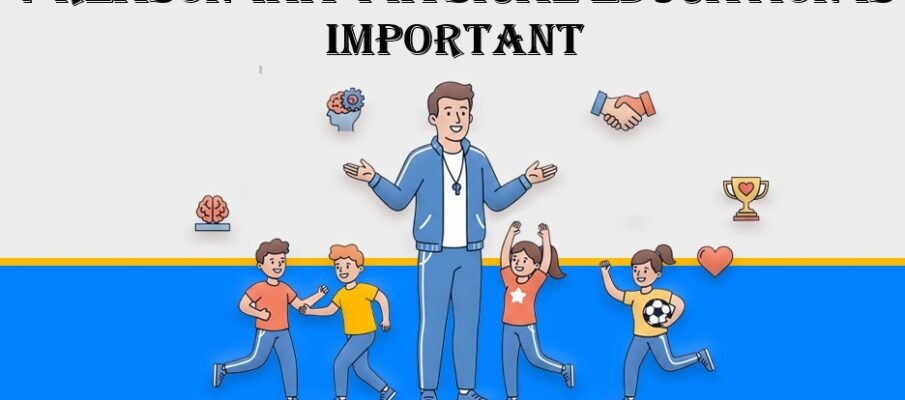Introduction: 7 reason why physical education is important
In today’s speedy-paced virtual worldwide, physical interest has significantly declined, particularly amongst youngsters and teenagers. With increasing show display time, academic stress, and sedentary existence, the importance of physical training has in no way been more. Physical education isn’t always quite an lousy lot sports activities sports or exercising; it is a based totally software program that promotes bodily fitness, intellectual health, scenario, teamwork, and lifelong healthful behavior.
Physical education performs a important feature in shaping an person’s bodily, emotional, and social improvement. Schools that prioritize physical education create healthier, more confident, and further disciplined university college students. Unfortunately, many educational establishments and parents nonetheless underestimate its importance, often thinking about it secondary to instructional subjects. 7 reason why physical education is important.
This article explores 7 motives why physical schooling is vital, explaining the manner it contributes to personal growth, educational excellence, and societal nicely-being. Whether you are a pupil, instructor, parent, or policymaker, understanding the charge of physical schooling can help create a greater wholesome future technology.
What Is Physical Education?
Physical training (PE) is an academic route designed to develop physical health, motor capabilities, knowledge of healthful residing, and exceptional attitudes closer to bodily hobby. It consists of based definitely physical activities, sports sports, video video games, yoga, dance, and fitness schooling tailored to definitely one of a type age agencies. 7 reason why physical education is important.
Key Objectives of Physical Education
- Improve bodily fitness and power
- Promote intellectual and emotional well-being
- Teach teamwork and leadership
- Develop concern and time manage
- Encourage lifelong wholesome conduct
7 Reasons Why Physical Education Is Important
1. Improves Physical Health and Fitness
One of the maximum vital reasons why bodily training is vital is its direct impact on physical fitness. Regular bodily interest lets in decorate cardiovascular staying power, muscular energy, flexibility, and commonplace body composition. 7 reason why physical education is important.
Physical training guarantees that students have interaction in daily or weekly physical hobby, which enables prevent lifestyle-related ailments which incorporates weight problems, diabetes, coronary heart sickness, and immoderate blood strain. 7 reason why physical education is important.
Key Physical Health Benefits
- Strengthens coronary coronary heart and lungs
- Improves muscle and bone health
- Enhances flexibility and coordination
- Helps maintain healthy body weight
Table: Physical Health Benefits of Physical Education
| Health Aspect | How Physical Education Helps |
|---|---|
| Cardiovascular Health | Improves heart efficiency and blood circulation |
| Muscular Strength | Builds strong muscles through exercise |
| Bone Density | Reduces risk of osteoporosis |
| Weight Management | Prevents obesity and unhealthy weight gain |
| Immunity | Strengthens immune system |
By incorporating set up bodily sports activities into every day exercises, bodily training lays the muse for a healthy manner of life.
2. Enhances Mental Health and Emotional Well-Being
Physical training isn’t always only approximately the body; it additionally performs a important position in intellectual health. Regular physical hobby releases endorphins, regularly known as “experience-proper hormones,” which assist reduce strain, anxiety, and despair.
Students who participate in physical education commands often display advanced mood, higher emotional manipulate, and accelerated self-self warranty. Physical interest moreover helps university college students address academic stress and emotional demanding situations.
Mental Health Benefits
- Reduces stress and anxiety
- Improves vanity and confidence
- Enhances emotional stability
- Helps manipulate anger and frustration
In an era in which intellectual fitness problems amongst students are growing, bodily schooling serves as a herbal and powerful answer.
3. Boosts Academic Performance
Many humans be given as true with that spending greater time on teachers ends in better instructional consequences. However, studies usually shows that bodily training truly enhances academic common overall overall performance. 7 reason why physical education is important.
Physical pastime improves blood flow to the mind, improving interest, reminiscence, and cognitive characteristic. Students who’re physical lively will be predisposed to perform better in topics like mathematics, era, and language studies.
How Physical Education Supports Learning
- Improves consciousness and interest span
- Enhances memory retention
- Reduces have a look at room fatigue
- Encourages excessive high-quality study room conduct
Table: Impact of Physical Education on Academic Skills
| Academic Skill | Impact of Physical Education |
|---|---|
| Concentration | Increased attention span |
| Memory | Better information retention |
| Problem-Solving | Enhanced cognitive abilities |
| Classroom Behavior | Reduced hyperactivity |
| Attendance | Lower absenteeism |
Thus, physical training facilitates each bodily health and educational excellence.
4. Develops Social Skills and Teamwork
Another key reason why bodily training is critical is its position in growing social abilties. Team sports activities sports and organization sports train students a manner to art work collectively, communicate efficiently, and admire others. 7 reason why physical education is important.
Through bodily training, college college students research the price of cooperation, leadership, and mutual respect. These social abilities are important for achievement in each private and professional lifestyles.
Social Skills Developed Through Physical Education
- Teamwork and collaboration
- Leadership and obligation
- Communication capabilities
- Sportsmanship and equity
Physical education additionally permits university university students construct friendships and boom a experience of belonging, it’s miles critical for emotional improvement. v7 reason why physical education is important.
5. Encourages Discipline and Time Management
Physical schooling instills issue and time manage abilties in college students. Regular practice, following pointers, and keeping fitness sporting occasions teach university students the importance of consistency and commitment.
Students learn how to balance academics, bodily hobby, and private lifestyles efficaciously. These behavior make contributions to success past the have a look at room. 7 reason why physical education is important.
Life Skills Gained from Physical Education
- Self-situation
- Goal placing
- Time manipulate
- Accountability
These competencies are transferable to teachers, careers, and private relationships, making physical education a basis for lifelong fulfillment. 7 reason why physical education is important.
6. Builds Lifelong Healthy Habits
One of the maximum lengthy-term blessings of physical training is the improvement of lifelong wholesome behavior. Students who are exposed to bodily education at an early age are much more likely to live energetic within the path of adulthood. 7 reason why physical education is important.
Physical training teaches university college students approximately:
- Importance of ordinary exercise
- Healthy manner of existence picks
- Nutrition and wellness
- Injury prevention
Table: Long-Term Benefits of Physical Education
| Age Group | Long-Term Impact |
|---|---|
| Children | Improved growth and development |
| Teenagers | Reduced risk of unhealthy habits |
| Adults | Lower risk of chronic diseases |
| Seniors | Better mobility and independence |
By selling an energetic way of existence, bodily education contributes to prolonged-time period fitness and excellent of existence. 7 reason why physical education is important.
7. Promotes Character Building and Moral Values
Physical schooling is a powerful tool for individual improvement. Sports and bodily sports activities educate vital values which incorporates honesty, perseverance, recognize, and resilience. 7 reason why physical education is important.
Students discover ways to address both success and failure gracefully. Losing a hobby teaches humility, at the same time as triumphing fosters self assurance with out arrogance.
Values Learned Through Physical Education
- Respect for regulations and authority
- Fair play and integrity
- Perseverance and resolution
- Responsibility and responsibility
These moral values shape humans into accountable residents and ethical leaders.
Importance of Physical Education in Schools
Physical schooling is a essential issue of school schooling. It complements academic gaining knowledge of and facilitates holistic improvement.
Why Schools Should Prioritize Physical Education
- Improves student health and attendance
- Enhances academic results
- Reduces behavioral issues
- Promotes inclusive mastering environments
Role of Teachers and Parents in Physical Education
Teachers and mother and father play a vital function in encouraging physical interest. While schools offer based programs, parental assist reinforces healthy conduct at home. 7 reason why physical education is important.
Ways Parents Can Support Physical Education
- Encourage outdoor play
- Limit display display time
- Participate in bodily sports activities sports
- Promote wholesome consuming conduct
Challenges in Implementing Physical Education
Despite its significance, physical schooling faces severa demanding situations:
- Lack of infrastructure
- Academic strain
- Limited recognition
- Insufficient professional instructors
Addressing these worrying situations calls for insurance guide, interest campaigns, and community involvement.
Future of Physical Education
With growing health worries, bodily education is evolving to encompass:
- Yoga and mindfulness
- Fitness technology
- Personalized health packages
- Mental nicely-being training
Integrating modern-day-day techniques can make physical schooling more engaging and effective.
Frequently Asked Questions (FAQs)
Why is physical training crucial for college college students?
Physical training improves physical fitness, highbrow well-being, educational ordinary average overall performance, and social competencies.
Is physical schooling obligatory in schools?
In many countries, physical training is obligatory due to its showed benefits.
Can physical training decorate highbrow fitness?
Yes, ordinary bodily hobby reduces pressure, anxiety, and melancholy.
Conclusion
Understanding the 7 reasons why bodily education is critical highlights its essential feature in private and societal development. Physical training isn’t sincerely an extracurricular interest; it’s miles a fundamental part of training that shapes healthful, disciplined, and confident people. 7 reason why physical education is important.
By prioritizing physical schooling, colleges, dad and mom, and policymakers can create a greater healthy, greater efficient society. Investing in bodily schooling today guarantees a more potent and more balanced future generation. 7 reason why physical education is important.
Disclaimer
The information provided in this article is for educational and informational purposes only. It is not intended as professional medical, health, or educational advice. Readers are encouraged to consult qualified professionals before making decisions related to physical activity, fitness programs, or educational practices.





